Abstract
A recently developed enzyme assay, utilizing [125I]-iododeoxyuridine as substrate, and capable of detecting normal levels of serum deoxythymidine kinase (s-dTk), was used in an investigation of sera from 155 untreated patients with non-Hodgkin's lymphoma (NHL). The patients were classified at the discovery of disease, both according to spread (stages I-IV according to the Ann Arbor classification) and to tumour histology (the Kiel classification). The results showed a significant correlation between s-dTk level and the extent of disease, as well as to the malignancy; i.e. the more advanced the disease or the more aggressive the tumour, the higher the s-dTk values. Greater than 100-fold increases in s-dTk levels were found in some patients compared to those reported for healthy individuals. A high pretreatment level of s-dTk for patients in stages III-IV correlated with a poor prognosis for the patient in terms of survival. This was consistent even when only patients in stages III-IV with "high-grade" malignant lymphomas were included in the analysis. Longitudinal studies of s-dTk levels in 19 NHL patients showed that s-dTk increases with progression of the disease, decreases during successful therapy, and finally increases during relapse. It is concluded that s-dTk could be used both as a prognostic marker and to monitor the effect of therapy in NHL patients.
Full text
PDF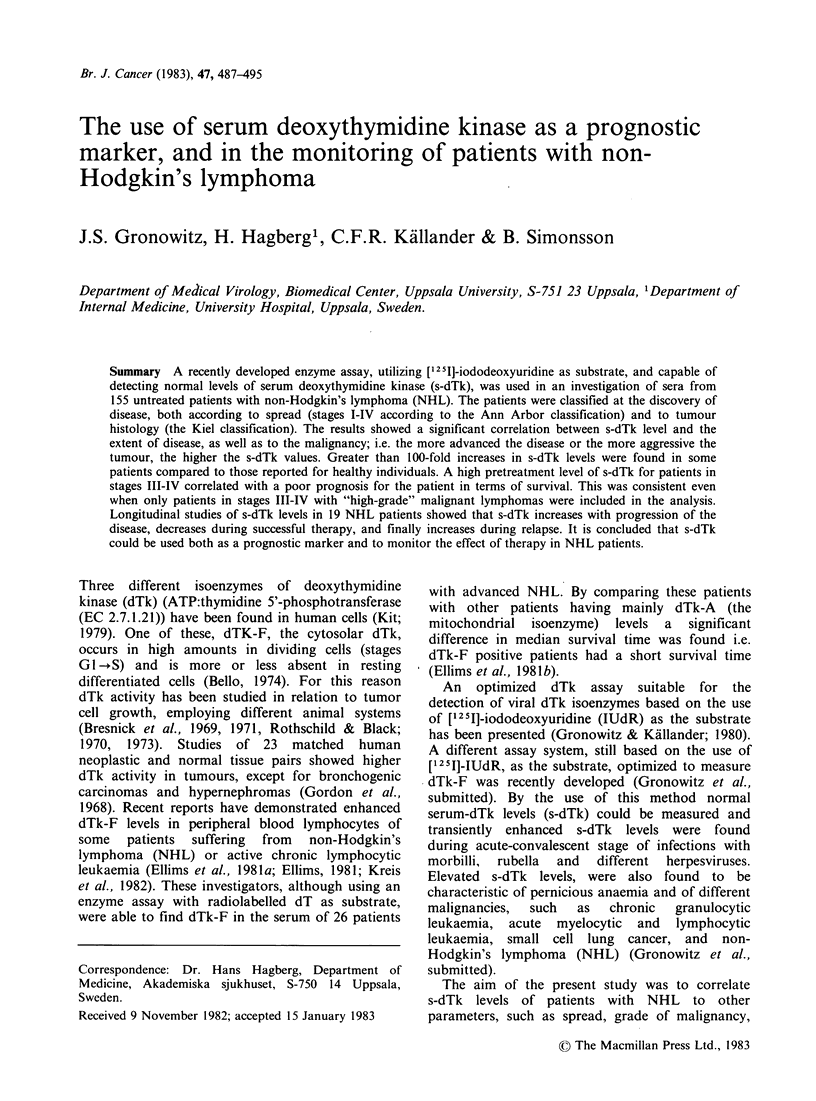
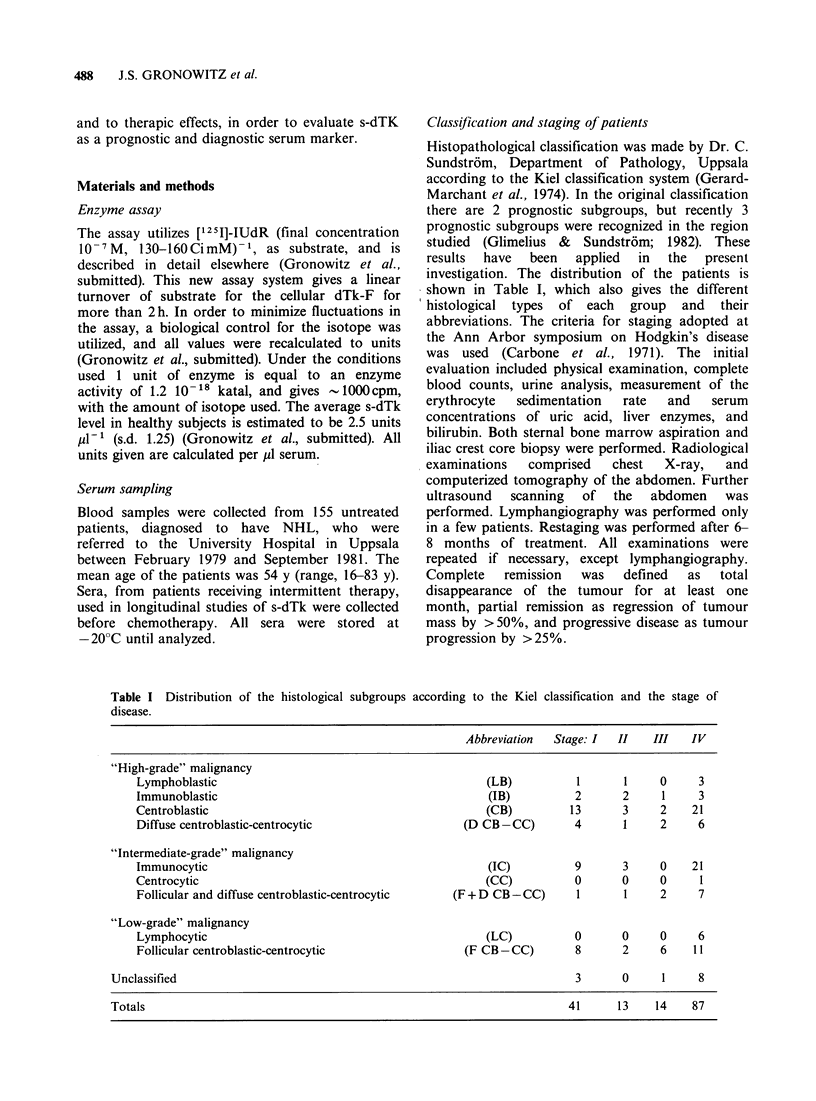
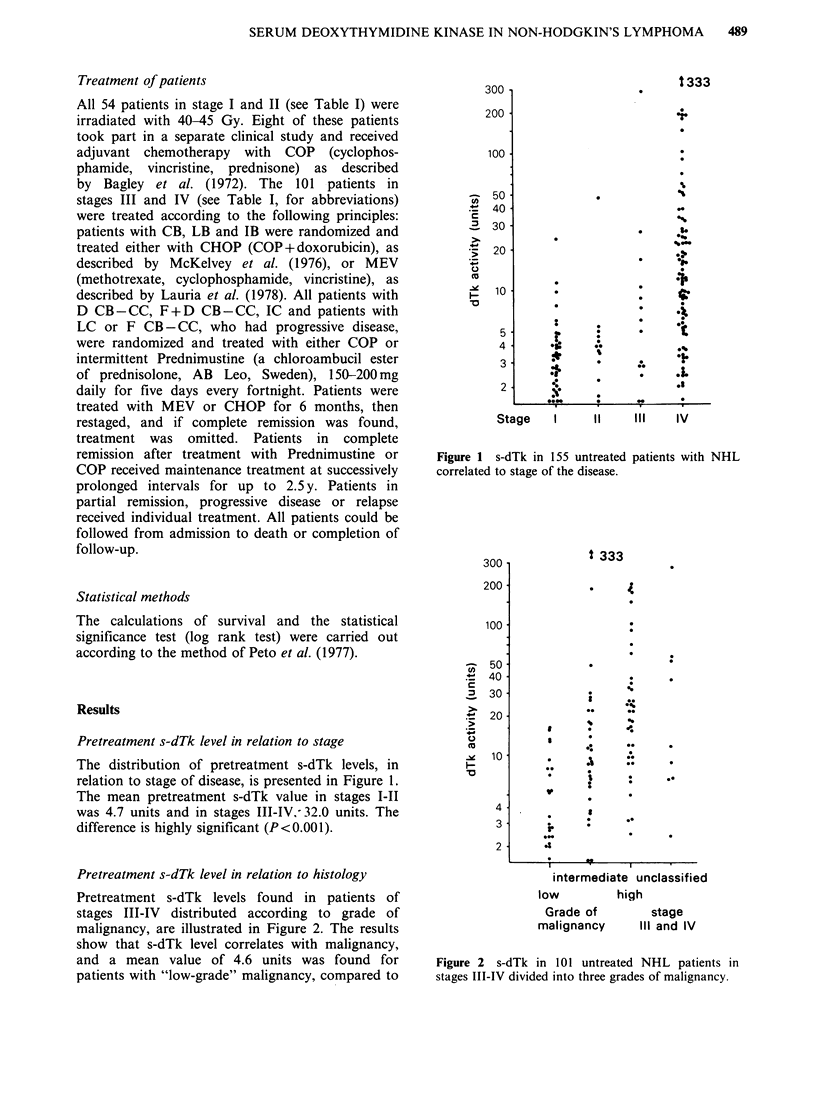
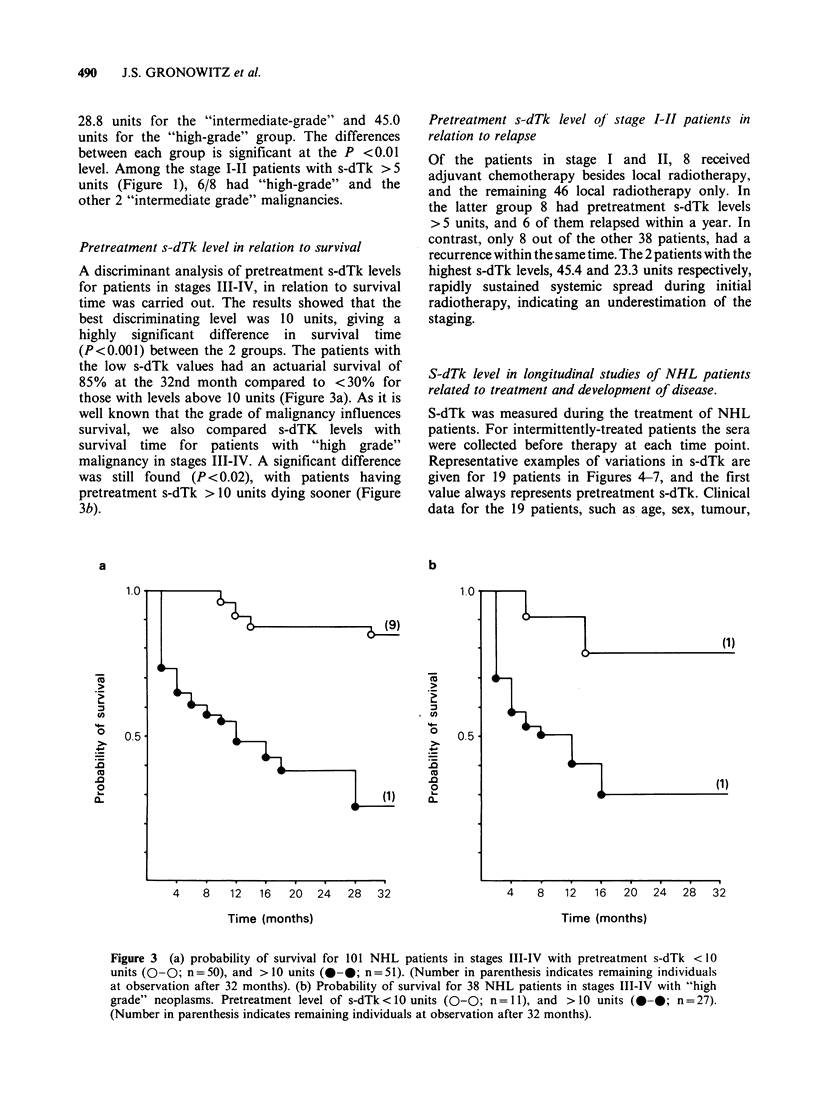
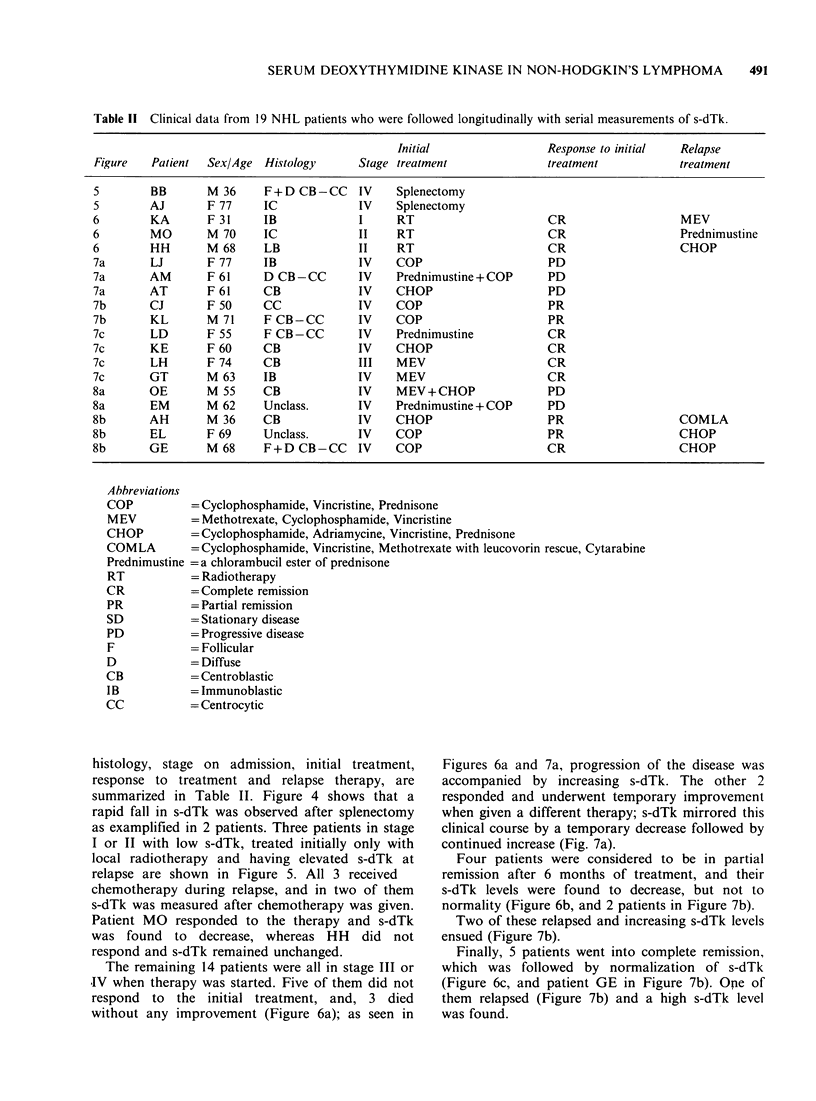
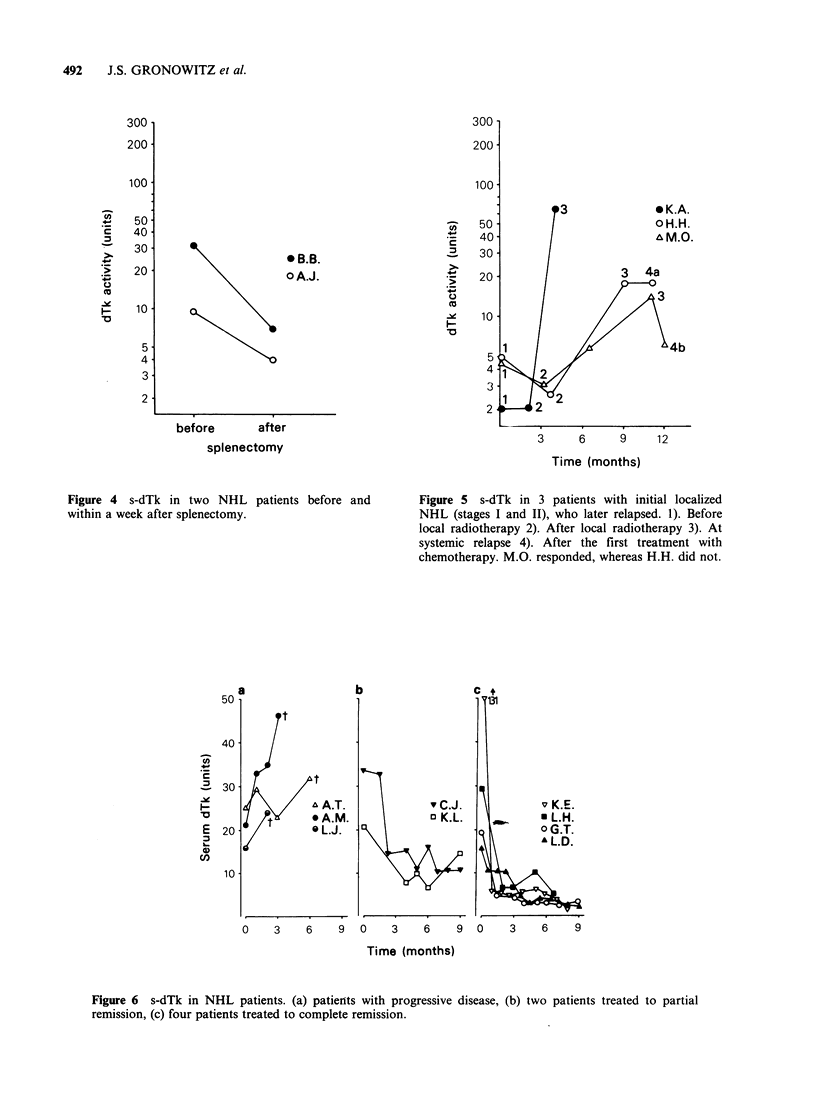
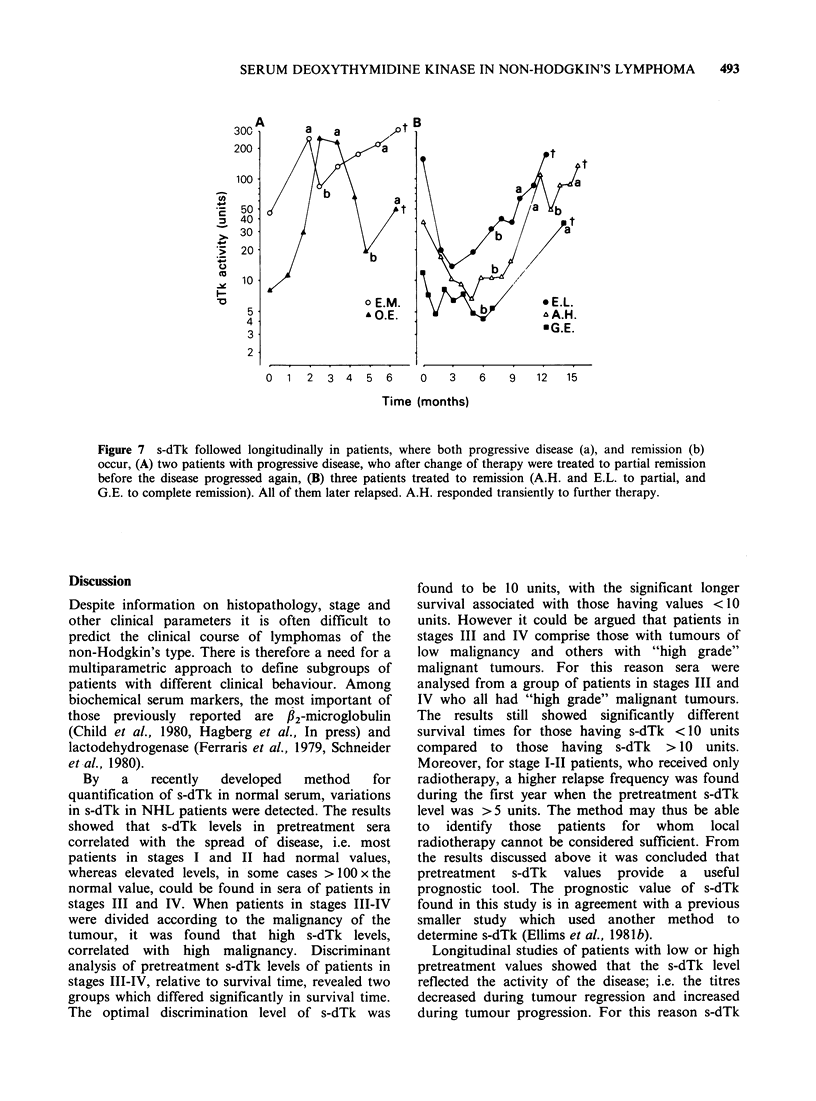
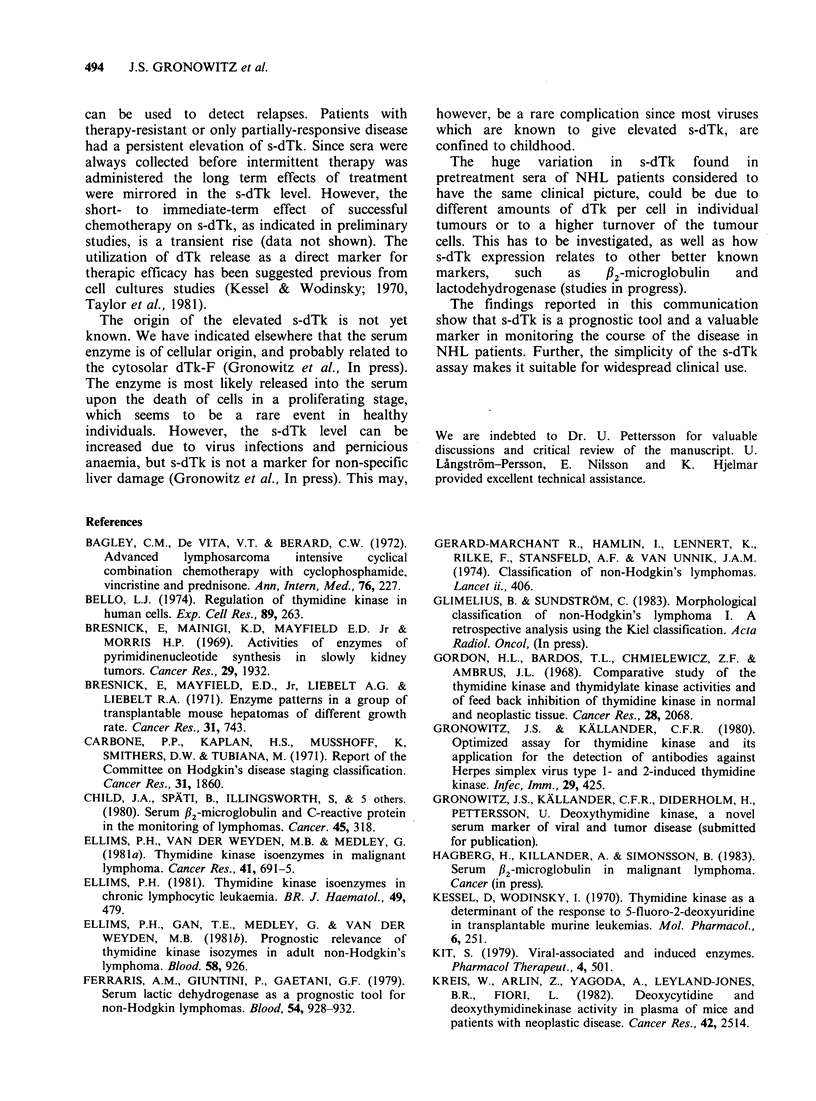
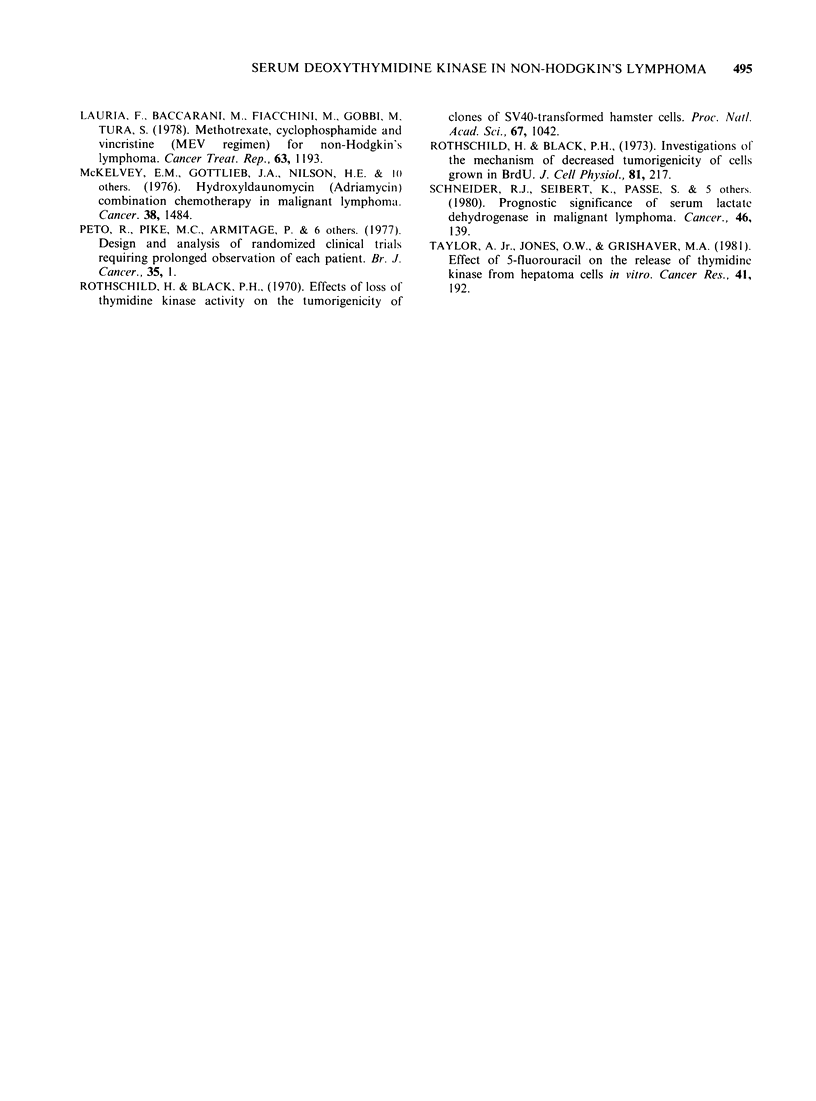
Selected References
These references are in PubMed. This may not be the complete list of references from this article.
- Bagley C. M., Jr, Devita V. T., Jr, Berard C. W., Canellos G. P. Advanced lymphosarcoma: intensive cyclical combination chemotherapy with cyclophosphamide, vincristine, and prednisone. Ann Intern Med. 1972 Feb;76(2):227–234. doi: 10.7326/0003-4819-76-2-227. [DOI] [PubMed] [Google Scholar]
- Bello L. J. Regulation of thymidine kinase synthesis in human cells. Exp Cell Res. 1974 Dec;89(2):263–274. doi: 10.1016/0014-4827(74)90790-3. [DOI] [PubMed] [Google Scholar]
- Bresnick E., Mainigi K. D., Mayfield E. D., Jr, Morris H. P. Activities of enzymes of pyrimidine nucleotide synthesis in slowly growing kidney tumors. Cancer Res. 1969 Nov;29(11):1932–1936. [PubMed] [Google Scholar]
- Bresnick E., Mayfield E. D., Jr, Liebelt A. G., Liebelt R. A. Enzyme patterns in a group of transplantable mouse hepatomas of different growth rates. Cancer Res. 1971 Jun;31(6):743–751. [PubMed] [Google Scholar]
- Carbone P. P., Kaplan H. S., Musshoff K., Smithers D. W., Tubiana M. Report of the Committee on Hodgkin's Disease Staging Classification. Cancer Res. 1971 Nov;31(11):1860–1861. [PubMed] [Google Scholar]
- Child J. A., Spati B., Illingworth S., Barnard D., Corbett S., Simmons A. V., Stone J., Worthy T. S., Cooper E. H. Serum beta 2 microglobulin and C-reactive protein in the monitoring of lymphomas: findings in a multicenter study and experience in selected patients. Cancer. 1980 Jan 15;45(2):318–326. doi: 10.1002/1097-0142(19800115)45:2<318::aid-cncr2820450220>3.0.co;2-c. [DOI] [PubMed] [Google Scholar]
- Ellims P. H., Eng Gan T., Medley G., Van Der Weyden M. B. Prognostic relevance of thymidine kinase isozymes in adult non-Hodgkin's lymphoma. Blood. 1981 Nov;58(5):926–930. [PubMed] [Google Scholar]
- Ellims P. H., Gan T. E., Van der Weyden M. B. Thymidine kinase isoenzymes in chronic lymphocytic leukaemia. Br J Haematol. 1981 Nov;49(3):479–481. doi: 10.1111/j.1365-2141.1981.tb07251.x. [DOI] [PubMed] [Google Scholar]
- Ferraris A. M., Giuntini P., Gaetani G. F. Serum lactic dehydrogenase as a prognostic tool for non-Hodgkin lymphomas. Blood. 1979 Oct;54(4):928–932. [PubMed] [Google Scholar]
- Gordon H. L., Bardos T. J., Chmielewicz Z. F., Ambrus J. L. Comparative study of the thymidine kinase and thymidylate kinase activities and of the feedbach inhibition of thymidine kinase in normal and neoplastic human tissue. Cancer Res. 1968 Oct;28(10):2068–2077. [PubMed] [Google Scholar]
- Gronowitz J. S., Källander C. F. Optimized assay for thymidine kinase and its application to the detection of antibodies against herpes simplex virus type 1- and 2-induced thymidine kinase. Infect Immun. 1980 Aug;29(2):425–434. doi: 10.1128/iai.29.2.425-434.1980. [DOI] [PMC free article] [PubMed] [Google Scholar]
- Kessel D., Wodinsky I. Thymidine kinase as a determinant of the response to 5-fluoro-2'-deoxyuridine in transplantable murine leukemias. Mol Pharmacol. 1970 May;6(3):251–254. [PubMed] [Google Scholar]
- Kit S. Viral-associated and induced enzymes. Pharmacol Ther B. 1979;4(3):501–585. doi: 10.1016/0163-7258(79)90004-4. [DOI] [PubMed] [Google Scholar]
- Kreis W., Arlin Z., Yagoda A., Leyland-Jones B. R., Fiori L. Deoxycytidine and deoxythymidine kinase activities in plasma of mice and patients with neoplastic disease. Cancer Res. 1982 Jun;42(6):2514–2517. [PubMed] [Google Scholar]
- Lauria F., Baccarani M., Fiacchini M., Frezza R., Gobbi M., Tura S. 5-year survey of methotrexate, cyclophosphamide (Endoxan), and vincristine (MEV) therapy for advanced non-Hodgkin's lymphomas. Cancer Treat Rep. 1978 Aug;62(8):1193–1197. [PubMed] [Google Scholar]
- McKelvey E. M., Gottlieb J. A., Wilson H. E., Haut A., Talley R. W., Stephens R., Lane M., Gamble J. F., Jones S. E., Grozea P. N. Hydroxyldaunomycin (Adriamycin) combination chemotherapy in malignant lymphoma. Cancer. 1976 Oct;38(4):1484–1493. doi: 10.1002/1097-0142(197610)38:4<1484::aid-cncr2820380407>3.0.co;2-i. [DOI] [PubMed] [Google Scholar]
- Rothschild H., Black P. H. Effect of loss of thymidine kinase activity on the tumorigenicity of clones of SV40-transformed hamster cells. Proc Natl Acad Sci U S A. 1970 Oct;67(2):1042–1049. doi: 10.1073/pnas.67.2.1042. [DOI] [PMC free article] [PubMed] [Google Scholar]
- Rothschild H., Black P. H. Investigations of the mechanism of decreased tumorigenicity of cells grown in BrdU. J Cell Physiol. 1973 Apr;81(2):217–224. doi: 10.1002/jcp.1040810209. [DOI] [PubMed] [Google Scholar]
- Schneider R. J., Seibert K., Passe S., Little C., Gee T., Lee B. J., 3rd, Miké V., Young C. W. Prognostic significance of serum lactate dehydrogenase in malignant lymphoma. Cancer. 1980 Jul 1;46(1):139–143. doi: 10.1002/1097-0142(19800701)46:1<139::aid-cncr2820460122>3.0.co;2-8. [DOI] [PubMed] [Google Scholar]
- Taylor A., Jr, Jones O. W., Grishaver M. A. Effect of 5-fluorouracil on the release of thymidine kinase from hepatoma cells in vitro. Cancer Res. 1981 Jan;41(1):192–196. [PubMed] [Google Scholar]


